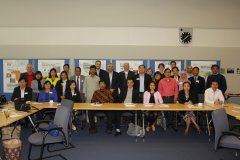
The UNESCO-UNEVOC International Centre: Who We Are | What We Do | Working With Us | Get in Touch
The UNEVOC Network: Learn About the Network | UNEVOC Network Directory
For Members: UNEVOC Centre Dashboard
Thematic Areas: Inclusion and Youth | Digital Transformation | Private Sector Engagement | SDGs and Greening TVET
Our Key Programmes & Projects: BILT: Bridging Innovation and Learning in TVET | Building TVET resilience | TVET Leadership Programme | WYSD: World Youth Skills Day
Past Activities: COVID-19 response | i-hubs project | TVET Global Forums | Virtual Conferences | YEM Knowledge Portal
Our Services & Resources: Publications | TVET Forum | TVET Country Profiles | TVETipedia Glossary | Innovative and Promising Practices | Toolkits for TVET Providers | Entrepreneurial Learning Guide
Events: Major TVET Events | UNEVOC Network News
 On 25 September 2015, UNESCO-UNEVOC hosted the visit of TVET practitioners from Cambodia, Laos, Myanmar, Vietnam and Indonesia. The study visit was part of the Regional Cooperation in TVET (RECOTVET) programme organised by the Deutsche Gesellschaft für Internationale Zusammenarbeit
On 25 September 2015, UNESCO-UNEVOC hosted the visit of TVET practitioners from Cambodia, Laos, Myanmar, Vietnam and Indonesia. The study visit was part of the Regional Cooperation in TVET (RECOTVET) programme organised by the Deutsche Gesellschaft für Internationale Zusammenarbeit![]() (GIZ) that is taking place in Germany from 21 to 30 September, 2015. The visit provided an opportunity for the 19 TVET managers, administrators and staff to learn from UNEVOC’s experiences and knowledge regarding regional harmonization trends and opportunities in TVET in the South-East Asia and Pacific region.
(GIZ) that is taking place in Germany from 21 to 30 September, 2015. The visit provided an opportunity for the 19 TVET managers, administrators and staff to learn from UNEVOC’s experiences and knowledge regarding regional harmonization trends and opportunities in TVET in the South-East Asia and Pacific region.
Mr Shyamal Majumdar, Head of UNESCO-UNEVOC, spoke on repositioning TVET in the post-2015 agenda and specifically made reference to the adoption of the Sustainable Development Goals![]() (SDGs) as an important consideration. Stressing the need to make TVET transformative, Mr Majumdar highlighted four dimensions for making TVET skills more relevant, namely social, technological, economic and educational. Furthermore he emphasized that this requires TVET transformations from lifelong learning, equitable and transformational perspectives. Speaking on the Asian context, Mr Majumdar gave an overview of the current situation in the Asia region and stressed that in order to reposition TVET in the region, more attention should be given to the image and perception of TVET, the capacity of TVET institutions and policies, and advancing the SDGs through Greening TVET.
(SDGs) as an important consideration. Stressing the need to make TVET transformative, Mr Majumdar highlighted four dimensions for making TVET skills more relevant, namely social, technological, economic and educational. Furthermore he emphasized that this requires TVET transformations from lifelong learning, equitable and transformational perspectives. Speaking on the Asian context, Mr Majumdar gave an overview of the current situation in the Asia region and stressed that in order to reposition TVET in the region, more attention should be given to the image and perception of TVET, the capacity of TVET institutions and policies, and advancing the SDGs through Greening TVET.
The UNEVOC team gave an overview of the international cooperation programmes and online resources coordinated and developed by the International Centre to support the promotion of UNESCO’s TVET strategy to the Member States.